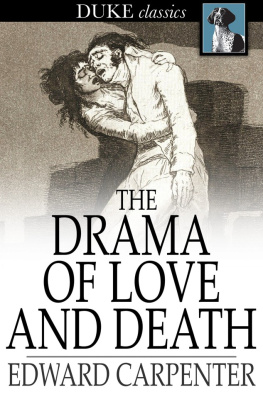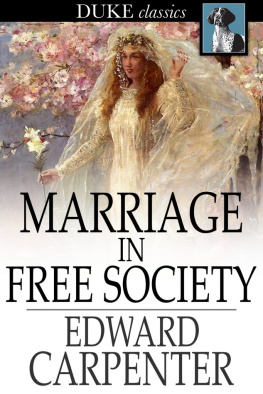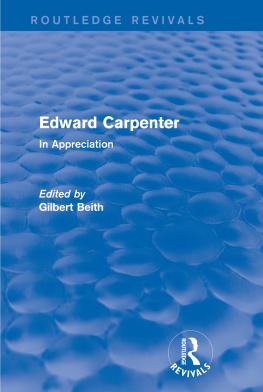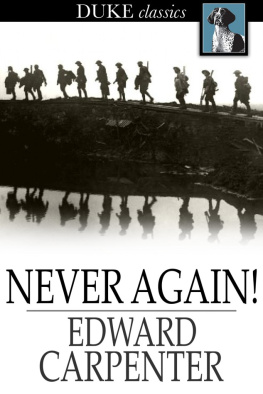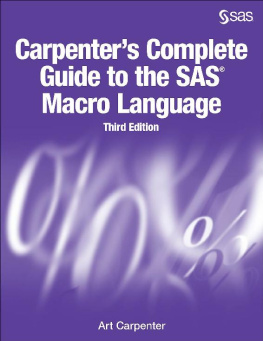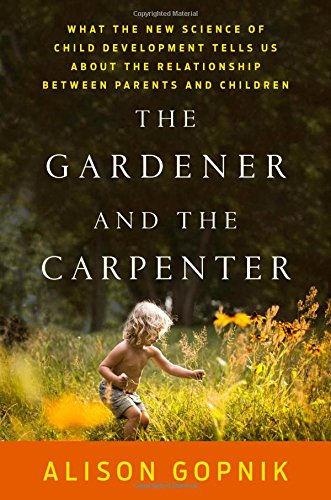THE DRAMA OF LOVE AND DEATH
A STUDY OF HUMAN EVOLUTION AND TRANSFIGURATION
* * *
EDWARD CARPENTER
*
The Drama of Love and Death
A Study of Human Evolution and Transfiguration
First published in 1912
ISBN 978-1-62013-991-2
Duke Classics
2014 Duke Classics and its licensors. All rights reserved.
While every effort has been used to ensure the accuracy and reliability of the information contained in this edition, Duke Classics does not assume liability or responsibility for any errors or omissions in this book. Duke Classics does not accept responsibility for loss suffered as a result of reliance upon the accuracy or currency of information contained in this book.
Contents
*
The Delphian Sibyl
*
(On her mountain-slope overlooking the Earth)
The coastline ranges far, the skies unfold;
The mountains rise in glory, stair on stair;
The darting Sun seeks Daphne as of old
In thickets dark where laurel blooms are fair.
The ancient sea, deep wrinkled, ever young,
With salt lip kisses still the silver strand;
In caverns dwell the Nymphs, their loves among,
And Titans still with strange fire shake the land.
A thousand generations here have come,
And wandered o'er these hills, and faced the light;
A thousand times slight man from mortal womb
Has leapt, and lapsed again into the night.
Here tribesmen dwelt, and fought, and curst their star,
And scoured both land and sea to sate their needs;
Prophetic eyes of youth gazed here afar,
With lips half open brooding on great deeds.
Nor dreamed each little mortal of the Past,
Nor the deep sources of his life divined,
Watching his herds, or net in ocean cast,
Deaf to th' ancestral voices down the wind;
Nor guessed what strange sweet likenesses should rise,
Selves of himself, far in the future years,
With his own soul within their sunlit eyes,
And in their hearts his secret hopes and fears.
Yet II saw. Yea, from my lofty stand
I saw each life continuous extend
Beyond its mortal bound, and reach a hand
To others and to others without end.
I saw the generations like a river
Flow down from age to age, and all the vast
Complex of human passion float and quiver
A wondrous mirror where the Gods were glassed.
And still through all these ages scarce a change
Has touched my mountain slopes or seaward curve,
And still the folk beneath the old laws range,
And from their ancient customs hardly swerve;
Still Love and Death, veiled figures, hand in hand,
Move o'er men's heads, dread, irresistible,
To ope the portals of that other land
Where the great Voices sound and Visions dwell.
Chapter I - Introductory
*
Love and Death move through this world of ours like thingsapartunderrunning it truly, and everywhere present, yet seeming tobelong to some other mode of existence. When Death comes, breaking intothe circle of our friends, words fail us, our mental machinery ceases tooperate, all our little stores of wit and wisdom, our maxims, ourmottoes, accumulated from daily experience, evaporate and are of noavail. These things do not seem to touch or illuminate in any effectiveway the strange vast Presence whose wings darken the world for us. Andwith Love, though in an opposite sense, it is the same. Words are of nouse, all our philosophy failswhether to account for the pain, or tofortify against the glamour, or to describe the glory of the experience.
These figures, Love and Death, move through the world, like closestfriends indeed, never far separate, and together dominating it in a kindof triumphant superiority; and yet like bitterest enemies, dogging eachother's footsteps, undoing each other's work, fighting for the bodiesand souls of mankind.
Is it possible that at length and after ages we may attain to liberateourselves from their overlordshipto dominate them and make them ourministers and attendants? Can we wrest them from their seeming tyrannyover the human race, and from their hostility to each other? Can wepersuade them to lay aside their disguise and appear to us for what theyno doubt areeven the angels and messengers of a new order ofexistence?
It is a great and difficult enterprise. Yet it is one, I think, which weof this generation cannot avoid. We can no longer turn our faces awayfrom Death, and make as if we did not perceive his presence or hear hischallenge. This age, which is learning to look the facts of Naturesteadily in the face, and see through them, must also learn to facethis ultimate fact and look through it. And it will surelyand perhapsonlybe by allying ourselves to Love that we shall be able to dosothat we shall succeed in our endeavor.
For after all it is not in the main on account of ourselves that wecherish a grudge against the 'common enemy' and dispute his authority,but for the sake of those we love. For ourselves we may be indifferentor acquiescent; but somehow for those others, for those divine ones whohave taken our hearts into their keeping, we resent the idea that theycan perish. We refuse to entertain the thought. Love in some mysteriousway forbids the fear of death. Whether it be Siegfried who tramples theflaming, circle underfoot, or the Prince of Heaven who breaks his waythrough the enchanted thicket, or Orpheus who reaches his Eurydice evenin the jaws of hell, or Hercules who wrestles with the lord of theunderworld for Alcestisthe ancient instinct of mankind has declared inno uncertain tone that in this last encounter Love must vanquish.
It is in the name, then, of one of these gods that we challenge theother. And yet not without gratitude to both. For it is Azrael'sinvasion of our world, it is his challenge to us, that (perhaps morethan anything else) rivets our loyalty to each other. It is his frownthat wakes friendship in human souls and causes them to tighten thebonds of mutual devotion. In some strange way these two, though seemingenemies, play into each other's hands; each holds the secret of theother, and between them they conceal a kindred life and some commonintimate relation. We feel this in our inmost intuitions; we perceive itin our daily survey of human affairs; and we find it illustrated (as Ishall presently point out) in general biology and the life-histories ofthe most primitive cells. The theme, in fact, of the interplay of Loveand Death will run like a thread-motive through this booknot withoutsome illumination, as I would hope, cast by each upon the other, and byboth upon our human destiny.
Chapter II - The Beginnings of Love
*
As I have just suggested, the great human problems of Love and Death arestrangely and remarkably illustrated in the most primitive forms oflife; and I shall consequently make no apology for detaining the readerfor a few moments over modern investigations into the subjects ofcell-growth, reproduction and death. If this chapter is a littletechnical and complex in places, still it may be worth while delayingover it, and granting it some patient consideration, on account of thecurious light the study throws on the rest of the book and the generalquestions therein discussed.
Love seems to be primarily (and perhaps ultimately) an interchange ofessences. The Protozoathose earliest cells, the progenitors of thewhole animal and vegetable kingdomgrow by feeding on the minuteparticles which they find in the fluid surrounding them. The growthcontinues, till ultimately, reaching the limit of convenient size, acell divides into two or more portions; and so reproduces itself. Thedescendant cells or portions so thrown off are simply continuations, bydivision, of the life of the original or parent cellso that it has notunfrequently been said that, in a sense, these Protozoa are immortal,since their life continues indefinitely (with branching but withoutbreak) from generation to generation. This form of reproduction bysimple budding or division extends even up into the higher types oflife, where it is sometimes found side by side with the later sexualform of reproduction, as in the case of so-called

